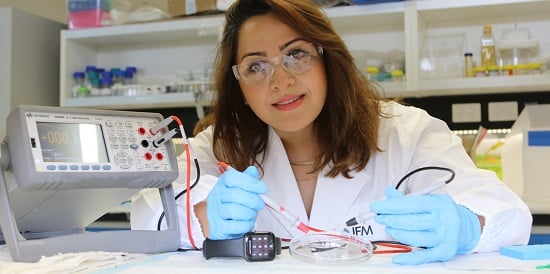New device harnesses sweat power for fitness trackers
Media release
A small amount of sweat could be all that's needed to power fitness trackers of the future, new research led by Deakin University's Institute for Frontier Materials (IFM) reveals.
In a paper published today in Device, Deakin researchers have outlined how they have designed a ground-breaking wearable hydroelectric nanogenerator - powerful enough to power small electronics such as FitBits and smart watches - that combines conductive nanomaterials and the evaporation of sweat to generate and store electrical power.
In the past, the mechanics of hydroelectric nanogenerators were little understood and had several shortcomings, including lower power output density, however this new technology integrates a single-layer MXene nanosheet with wool as the electrochemically active component.
'Imagine a tiny device that you could wear, like a bracelet or headband, that could generate electricity from something as simple as your sweat,' research co-author IFM Associate Professor Jingliang Li said.
'The device only needs a small amount of sweat to operate - only few drops to cover the surface of the device.
'Operation-wise a device needs sweat to generate the current, but since the device is attached to a capacitor, the generated current can be stored. This does not require the wearer to sweat continuously.
'Similar to a solar panel generating electricity, the generated current can be gradually stored in another device.'
Figures have shown that more than half of Australians track their fitness with a smartphone, smart watch or fitness band.
This breakthrough research - led at IFM by Associate Professor Li, Dr Azadeh Nilghaz and PhD candidate Hongli Su - could provide a greener, and low maintenance alternative to meet that demand.
Further development is needed before the technology could be commercialised for public sale; however, the device shows promise of being easy and low-cost to fabricate.
Looking ahead, the research team hopes to explore how the device can generate electricity if they don't sweat.
'The device can generate electricity from the moisture produced by breathing,' Associate Professor Li said.
'This is our future work.'

